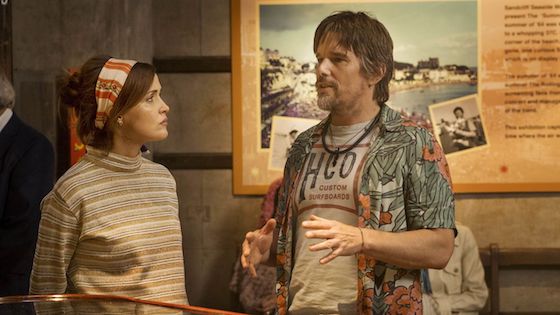

[Rating: Solid Rock Fist Up]
A film that isn’t content to just dance along the edges of easy thematic territory like mid-life crises or rabid fandom, Juliet, Naked kicks over every stone in front of it, exploring all manner of joy, fear, and trauma. Ostensibly a tale about long-distance romance, the movie cuts a big slice for itself and never finds itself wanting.
Adapted from the Nick Hornby novel of the same name, Juliet, Naked opens with music-devotee Duncan (Chris O’Dowd) vlogging to the fan community of a reclusive early-90s alt-rocker. The object of their obsession is Tucker Crowe (Ethan Hawke), who released a mildly successful album called ‘Juliet’ over twenty years ago, then vanished from the public eye. The tortured nature of the album’s music combined with the mythical nature of Crowe’s disappearance has given birth to a small but rabid fanbase that consumes every scrap of information they can find about the artist, and Duncan is their de-facto leader.
Duncan’s girlfriend, Annie (Rose Byrne), then introduces herself via voiceover as the curator of a small township museum in England. It seems that she is with Duncan almost out of habit at this point, and for his part, Duncan appears to be more in love with Tucker Crowe than Annie. When Annie accidentally opens Duncan’s mail one day to find a rare demo of ‘Juliet’ titled “Juliet, Naked,” it kicks off a heated argument that leads to Annie posting a scathing review of the album on the fan-site Duncan moderates. Annie is one of the few voices of dissent, but it leads to an unexpected email one day from Crowe himself, who agrees with Annie’s harsh assessment.
 This correspondence then kicks off a budding online friendship, and when Crowe visits England to meet one of his many children and his new grandchild, things heat up even further between the two. As Juliet, Naked proceeds, it unpacks the contortions people put themselves through to make peace with who they were, what they’ve become, and what they want to be. The fact that she’s still with Duncan serves as an ever-present reminder that Annie isn’t living her best life, and when she talks to Crowe, who is brutally honest about his own failures as a father and partner, it encourages a level of self-reflection in her that she hasn’t experienced in years.
This correspondence then kicks off a budding online friendship, and when Crowe visits England to meet one of his many children and his new grandchild, things heat up even further between the two. As Juliet, Naked proceeds, it unpacks the contortions people put themselves through to make peace with who they were, what they’ve become, and what they want to be. The fact that she’s still with Duncan serves as an ever-present reminder that Annie isn’t living her best life, and when she talks to Crowe, who is brutally honest about his own failures as a father and partner, it encourages a level of self-reflection in her that she hasn’t experienced in years.
Director Jesse Peretz does a wonderful job moving quickly through the dense backstories of all these characters, and gives each their moment to contribute to the overall effort. Even Duncan, who is set up as something of a heel for the narrative, has a poignant moment when he confronts Crowe about the musician’s bashing of ‘Juliet.’ Crowe argues that the work is garbage, but Duncan poignantly protests, stating that the music means something to him. Duncan almost-tearfully explains that to Crowe’s fans, ‘Juliet’ is profound in ways that even the author couldn’t understand.
It’s a quick moment, but it brings up a fascinating argument about art, and when (if ever) its ownership transfers from the creator to the consumer. George Lucas or Disney might argue that it never does, but millions of fans, some of them especially vocal and toxic, would disagree. It’s an especially prescient moment in Juliet, Naked, and it doesn’t even represent the main thrust of the film’s thematic push. The story about what drove Crowe into exile, and how he’s coming to terms with the mistakes of his past serve that role, and it is a marvelous journey.
 Ethan Hawke is as good as he’s ever been here, and channels a faded star persona that likely feels just a few beats away from familiar. His Crowe character has a lot of regrets about his romantic life, and the relationships he’s had (or hasn’t) with his kids. Annie is at the opposite end of that spectrum, looking back at a life without much risk, and no children to show for it. How the two of them come together to sort out their conflicting mid-life crises pushes Juliet, Naked along at a brisk pace, and feels genuine every step of the way.
Ethan Hawke is as good as he’s ever been here, and channels a faded star persona that likely feels just a few beats away from familiar. His Crowe character has a lot of regrets about his romantic life, and the relationships he’s had (or hasn’t) with his kids. Annie is at the opposite end of that spectrum, looking back at a life without much risk, and no children to show for it. How the two of them come together to sort out their conflicting mid-life crises pushes Juliet, Naked along at a brisk pace, and feels genuine every step of the way.
There’s a lot to recognize from Nick Hornby’s previous cannon in this one, starting with the blinding obsession displayed by Duncan towards Tucker Crowe, which is reminiscent of Fever Pitch. The voice-over narrative structure from High Fidelity and About a Boy is also used again here, albeit minimally. It isn’t as forward or direct as what’s found in those films, and is used more as an expository guide rather than the crutch upon which the script rests. It works well, especially when Juliet, Naked moves into its You’ve Got Mail phase of plotting via voiceover email composition.
Opening today, Juliet, Naked is an introspective examination of regret, love, fandom, and intimacy. Bolstered by strong performances by Byrne and Hawke, along with scene-stealing assists from O’Dowd, the film taps into several timely themes that never come off as forced, or obtrusive. Juliet might be “naked” in this film, but in terms of finding the perfect form of support and expression, this movie is her robe-carrying Romeo.





Comments on this entry are closed.